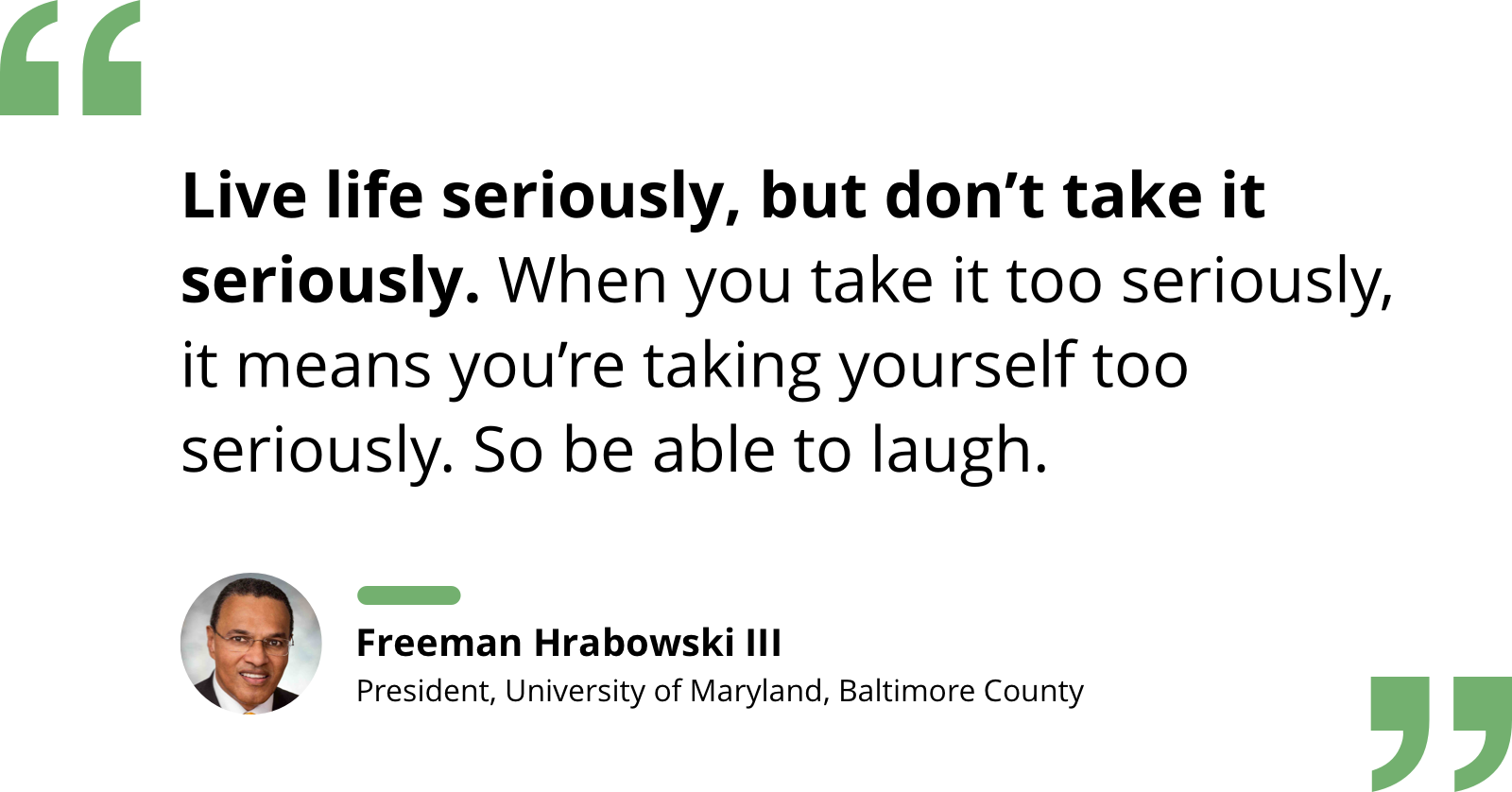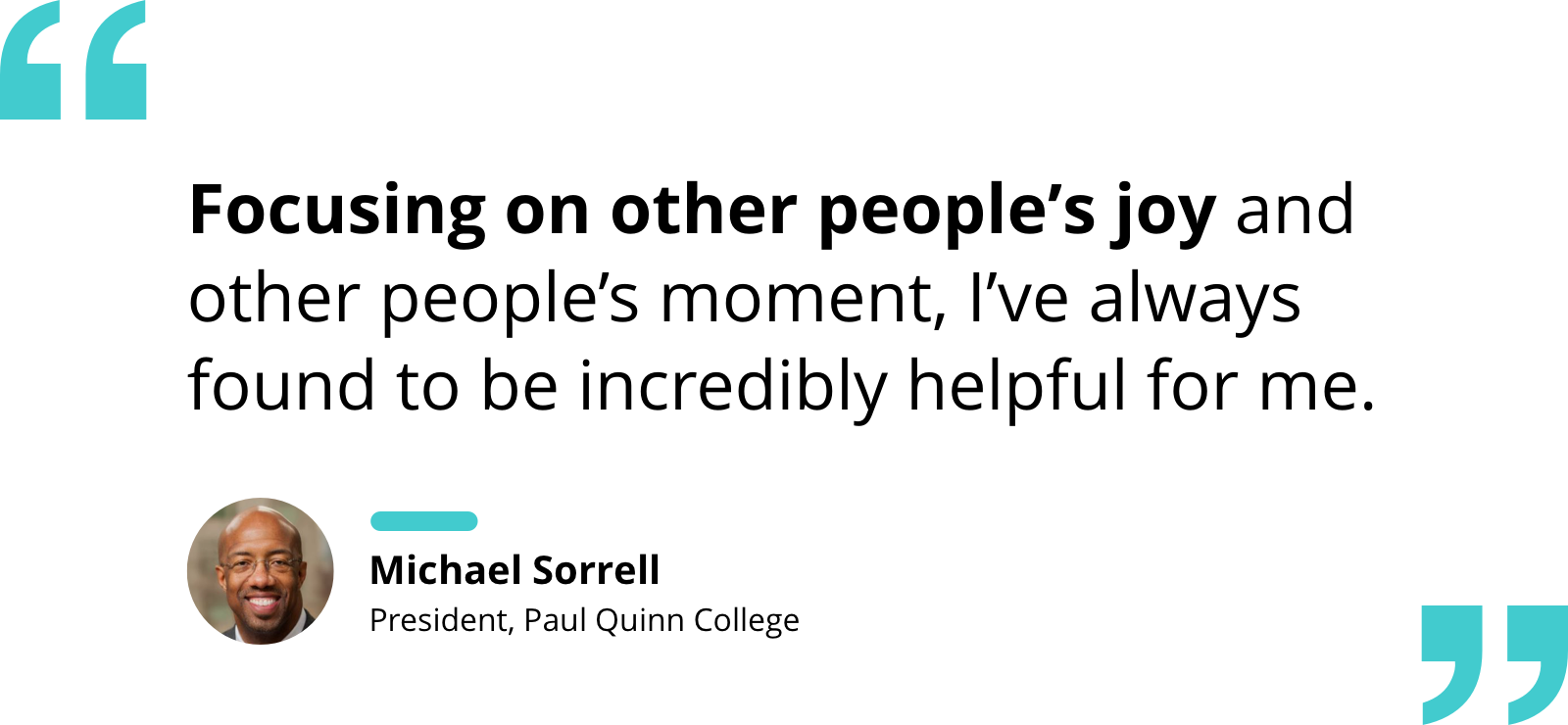Burnout is a serious problem for higher education leaders when everyone is looking to you for direction and inspiration. Giving in to mental exhaustion diminishes your ability to serve. Yet after the new academic year's first blush of excitement wears off, burnout looms with the realization that you're in it for the long haul. To help you through this moment, we offer 14 pieces of inspiring advice that we've heard from college presidents and chancellors on our Innovating Together Podcast.
Take Some "Me Time"
Despite the tremendous, nonstop responsibility of running an institution, ensuring student success, and advancing the best possible vision for higher ed, everyone needs a little "me time" to step back from all the pressure and self-regulate. Don't feel guilty. You need this, too.
1. "There’s a certain point in the evening where I just turn the phone over and, unless it goes crazy, I just ignore it." - Mark P. Becker (Former President, Georgia State University)
2. "Art can make us feel stronger, powerful, faster, more precise, better. It’s creativity and it’s human connection we can engage with as extensions of each other to do something good in the world." - Gabrielle Starr (President, Pomona College)
3. "A dance break on a daily basis doesn’t hurt anybody. It’s really fun and it keeps me alive." - Shirley Collado (President, Ithaca College)
4. "Live life seriously, but don’t take it seriously. Because when you take it too seriously, it means you’re taking yourself too seriously. So be able to laugh." - Freeman Hrabowski III (President, University of Maryland, Baltimore County)

Nourish Your Inner Life
To successfully fight burnout, sometimes it's necessary to go deeper. These leaders revealed the self-care practices that help them rejuvenate and restore their best self.
5. "Social media can be a mean place. Every year during Lent, I give up social media because I need that cleansing." - Walter M. Kimbrough (President, Dillard University)
6. "I have learned to meditate, to create a space where nothing can get in for some amount of time, which usually brings me closer to my values right after I come out of a meditation." - Michael Rao (President, Virginia Commonwealth University)
7. "My Peleton has really helped me tremendously to sweat out my frustrations, think about things, and get my mind together." - Daria J. Willis (President, Everett Community College)
Focus on Other Individuals
While burnout may be a personal issue, the cure doesn't always have to happen in solitude. Sometimes the welcome presence of others can break us out of that downward spiral.
8. "[The pandemic gave] the gift of time to spend with each other in families and small groups. I hope that we learn something about our place and about using our time for the collective good." - Ruth Watkins (Former President, University of Utah)
9. "We’ve created a safe space where people can talk about, 'I am struggling, I am sad, I am scared.' And I want people to know that I will hear them. Also, focusing on other people’s joy and other people’s moment, I’ve always found to be incredibly helpful for me." - Michael Sorrell (President, Paul Quinn College)

Love Your Institution
For leaders who don't have the time or inclination to disengage from the day-to-day, broadening their focus to embrace the entire institution makes burnout much less of a concern. Watching plans and decisions turn into processes and outcomes can be exciting and deeply gratifying.
10. "U.C.F. is a young institution, and that has created a can-do attitude. I just can’t say enough good things about the people that we have here, their ability to accept change, to say, 'Let’s make things happen.'" - Alexander Cartwright (President, University of Central Florida)
11. "We have more capabilities than we had before. You look at people like Louis Pasteur and other scientists that were able to step through time. We're gonna have that again, and those things are gonna happen. All that stuff is very inspiring to me." - Michael Crow (President, University of Arizona)
12. "Many years ago, I said, 'I don’t know if we can take a vacation.' My wife said, 'You need to take a vacation because everyone watches you. If you don't take a vacation, they think they shouldn't either.'" - Kim Wilcox (Chancellor, University of California, Riverside)
Focus on the Students
Higher education wouldn't exist without those who come to be educated, and some of our leaders have cured their burnout by simply tuning into the students.
13. "The kind of idealism that young people have, and their determination to meet a whole range of challenges head on – the pandemic, environmental challenges, systemic racism – they are unafraid. And that to me is just so incredibly refreshing, and so energizing, and it keeps me young." - Ana Mari Cauce (President, University of Washington)
14. "My students give me strength and inspiration every day." - Freeman Hrabowski III (President, University of Maryland, Baltimore County)
Burnout is a natural human reaction to ongoing, unrelenting demands on our attention and energy. And like the rest of us, higher ed leaders are only human. Some of the perspectives and practices mentioned here could be just what you need to refresh your outlook. For further suggestions about combatting burnout, please see the UIA's September 30, 2021 newsletter.
Note: The interviews cited in this blog were drawn from the Weekly Wisdom Series and originally aired between April 20, 2020 and August 30, 2021 as part of the University Innovation Alliance’s Innovating Together Podcast, created in partnership with Inside Higher Ed.

